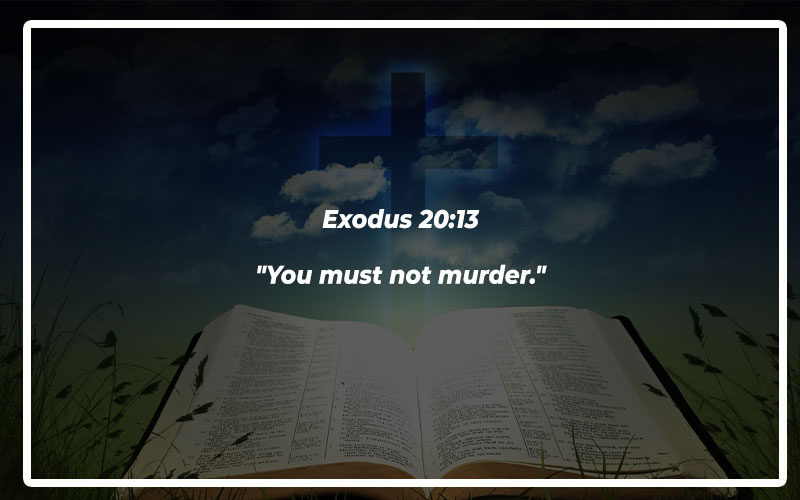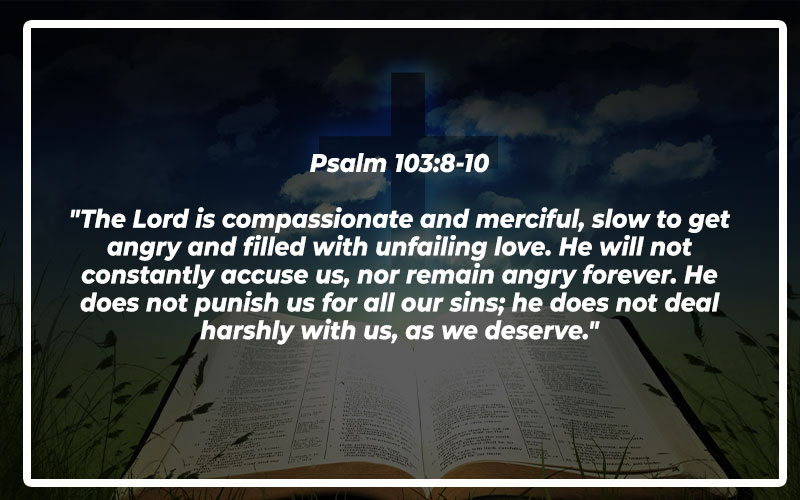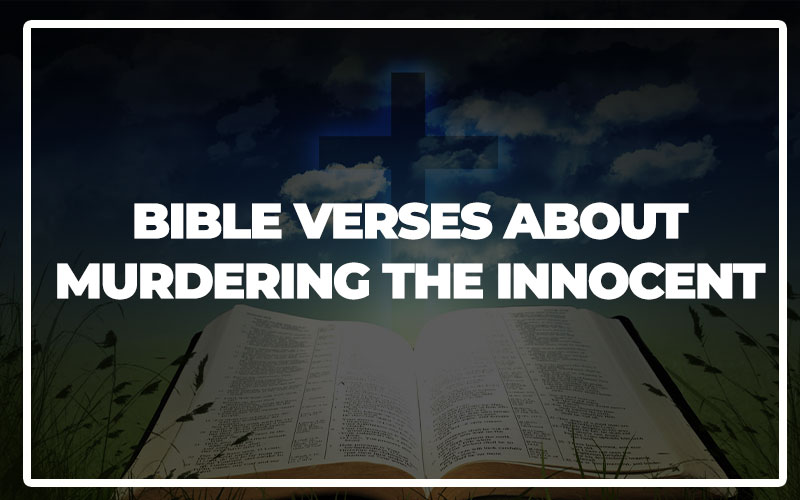The Bible speaks strongly against the act of taking innocent life. These verses remind us of the sanctity of life and the importance of justice and mercy. Below are seven key themes with corresponding Bible verses that address the issue of murdering the innocent.
Also Read: Bible Verses About Betrayal
God’s Command Against Murder
The Bible clearly states that murder is a sin. It is an act that goes against God’s commandments and His design for human life. The following verses emphasize the prohibition of taking innocent life.
Exodus 20:13
“You must not murder.”

This commandment is one of the Ten Commandments, emphasizing the importance of respecting life. It serves as a fundamental moral law that highlights the value of human life and the need to protect it.
Genesis 9:6
“If anyone takes a human life, that person’s life will also be taken by human hands. For God made human beings in his own image.”
This verse underscores the seriousness of taking a life, as humans are created in the image of God. It reflects the sanctity of life and the corresponding justice for those who commit murder.
Proverbs 6:16-17
“There are six things the Lord hates—no, seven things he detests: haughty eyes, a lying tongue, hands that kill the innocent…”
The list of things the Lord detests includes “hands that kill the innocent,” highlighting the severity of such an act. It demonstrates God’s abhorrence of violence against the innocent.
Matthew 5:21-22
“You have heard that our ancestors were told, ‘You must not murder. If you commit murder, you are subject to judgment.’ But I say, if you are even angry with someone, you are subject to judgment!”
Jesus extends the commandment against murder to include anger and hatred. This teaching emphasizes the heart’s condition, showing that even harboring anger can lead to judgment.
Romans 13:9
“For the commandments say, ‘You must not commit adultery. You must not murder. You must not steal. You must not covet.’ These—and other such commandments—are summed up in this one commandment: ‘Love your neighbor as yourself.'”
This verse highlights that the commandment not to murder is part of a broader moral framework centered on love. Loving others as ourselves includes valuing their lives and protecting them from harm.
The Innocent as God’s Creation
Every human life is precious because it is God’s creation. The Bible teaches that life is a gift from God and should be protected, especially the lives of the innocent.
Psalm 127:3
“Children are a gift from the Lord; they are a reward from him.”
This verse emphasizes the value of life, particularly the lives of children. It reminds us that all life is a gift from God and should be cherished and protected.
Psalm 139:13-14
“You made all the delicate, inner parts of my body and knit me together in my mother’s womb. Thank you for making me so wonderfully complex! Your workmanship is marvelous—how well I know it.”
The Psalmist celebrates God’s intricate creation of human life, acknowledging the divine care involved in our formation. This recognition of God’s hand in creating life emphasizes its sacredness.
Jeremiah 1:5
“I knew you before I formed you in your mother’s womb. Before you were born I set you apart and appointed you as my prophet to the nations.”
God’s words to Jeremiah illustrate His intimate knowledge and purpose for every individual, even before birth. This underscores the value of each person and the importance of protecting the innocent.
Matthew 19:14
“But Jesus said, ‘Let the children come to me. Don’t stop them! For the Kingdom of Heaven belongs to those who are like these children.'”
Jesus’ welcoming of children highlights their importance in God’s kingdom. It shows that God values the innocent and vulnerable, and we are called to do the same.
James 1:27
“Pure and genuine religion in the sight of God the Father means caring for orphans and widows in their distress and refusing to let the world corrupt you.”
This verse calls believers to protect and care for the vulnerable, including orphans and widows. It challenges us to uphold justice and mercy for the innocent and defenseless.
Justice for the Innocent
God’s word consistently calls for justice and righteousness, especially for those who are innocent and vulnerable. The Bible warns against perverting justice and harming those who are innocent.
Isaiah 1:17
“Learn to do good. Seek justice. Help the oppressed. Defend the cause of orphans. Fight for the rights of widows.”
This verse exhorts believers to actively seek justice and protect the rights of the vulnerable. It highlights God’s concern for those who are oppressed and defenseless.
Proverbs 31:8-9
“Speak up for those who cannot speak for themselves; ensure justice for those being crushed. Yes, speak up for the poor and helpless, and see that they get justice.”
These verses call for advocacy on behalf of those who cannot defend themselves. It underscores the responsibility of the faithful to ensure justice for the innocent and oppressed.
Micah 6:8
“No, O people, the Lord has told you what is good, and this is what he requires of you: to do what is right, to love mercy, and to walk humbly with your God.”
God’s requirement for His people includes doing what is right, which involves protecting the innocent and seeking justice. It emphasizes a life of integrity and compassion.
Zechariah 7:9-10
“This is what the Lord of Heaven’s Armies says: Judge fairly, and show mercy and kindness to one another. Do not oppress widows, orphans, foreigners, and the poor. And do not scheme against each other.”
God commands fairness and mercy, especially towards the vulnerable. This call to justice reflects His desire for a compassionate and equitable society.
Matthew 23:23
“What sorrow awaits you teachers of religious law and you Pharisees. Hypocrites! For you are careful to tithe even the tiniest income from your herb gardens, but you ignore the more important aspects of the law—justice, mercy, and faith. You should tithe, yes, but do not neglect the more important things.”
Jesus criticizes religious leaders for neglecting the more crucial aspects of the law, including justice and mercy. This serves as a reminder that caring for the innocent and ensuring justice is central to faith.
Also Read: Bible Verses About Guilt
The Value of Life
The Bible repeatedly affirms the value of human life. Each person is created in the image of God, and taking an innocent life is a grave sin that violates the sanctity of life.
Genesis 1:27
“So God created human beings in his own image. In the image of God he created them; male and female he created them.”
This foundational verse establishes the intrinsic value of every human being, as all are created in God’s image. It serves as a basis for the protection of life.
Psalm 8:4-5
“What are mere mortals that you should think about them, human beings that you should care for them? Yet you made them only a little lower than God and crowned them with glory and honor.”
These verses reflect on the honor and dignity bestowed upon humanity by God. They highlight the special place humans hold in creation and the importance of respecting life.
Matthew 10:29-31
“What is the price of two sparrows—one copper coin? But not a single sparrow can fall to the ground without your Father knowing it. And the very hairs on your head are all numbered. So don’t be afraid; you are more valuable to God than a whole flock of sparrows.”
Jesus emphasizes the value God places on every individual, reassuring that we are precious to Him. This understanding calls for the protection of all life, especially the innocent.
1 Corinthians 6:19-20
“Don’t you realize that your body is the temple of the Holy Spirit, who lives in you and was given to you by God? You do not belong to yourself, for God bought you with a high price. So you must honor God with your body.”
These verses remind believers that their bodies are temples of the Holy Spirit and belong to God. This understanding calls for honoring God by respecting and protecting life.
James 3:9
“Sometimes it praises our Lord and Father, and sometimes it curses those who have been made in the image of God.”
James points out the inconsistency in praising God while cursing those made in His image. This serves as a call to recognize and respect the inherent worth of every individual.
Consequences of Taking Innocent Life
The Bible warns of severe consequences for those who shed innocent blood. These consequences reflect God’s justice and the seriousness of the sin of murder.
Numbers 35:33
“This will ensure that the land where you live will not be polluted, for murder pollutes the land. And no sacrifice except the execution of the murderer can purify the land from murder.”
This verse highlights the defilement caused by murder and the necessity of justice to cleanse the land. It underscores the seriousness of shedding innocent blood.
Deuteronomy 19:10
“That way you will prevent the death of innocent people in the land the Lord your God is giving you as your special possession. You will not be held responsible for the death of innocent people.”
This commandment aims to prevent the shedding of innocent blood and protect the community from guilt. It emphasizes the collective responsibility to uphold justice and protect life.
Psalm 106:38
“They shed innocent blood, the blood of their sons and daughters. By sacrificing them to the idols of Canaan, they polluted the land with murder.”
The Psalmist condemns the shedding of innocent blood in idolatrous practices. This act brought judgment upon the people, illustrating the severe consequences of such sins.
Isaiah 59:7
“Their feet run to do evil, and they rush to commit murder. They think only about sinning. Misery and destruction always follow them.”
Isaiah describes the destructive path of those who commit evil, including murder. This passage warns of the inevitable consequences of a life given to sin and violence.
Revelation 21:8
“But cowards, unbelievers, the corrupt, murderers, the immoral, those who practice witchcraft, idol worshipers, and all liars—their fate is in the fiery lake of burning sulfur. This is the second death.”
This verse in Revelation speaks of the final judgment, where murderers and other sinners face eternal punishment. It serves as a sobering reminder of the seriousness of sin and the necessity of repentance.
God’s Justice and Mercy
While the Bible condemns murder, it also speaks of God’s justice and mercy. God offers forgiveness and redemption to those who repent, but justice will ultimately prevail.
Psalm 103:8-10
“The Lord is compassionate and merciful, slow to get angry and filled with unfailing love. He will not constantly accuse us, nor remain angry forever. He does not punish us for all our sins; he does not deal harshly with us, as we deserve.”

This passage highlights God’s mercy and compassion, even towards sinners. It reassures us that God’s love and forgiveness are available, emphasizing the hope of redemption.
Isaiah 1:18
“‘Come now, let’s settle this,’ says the Lord. ‘Though your sins are like scarlet, I will make them as white as snow. Though they are red like crimson, I will make them as white as wool.'”
God invites sinners to seek forgiveness and be cleansed. This verse emphasizes God’s willingness to forgive and restore, offering a new beginning to those who repent.
John 3:16
“For this is how God loved the world: He gave his one and only Son, so that everyone who believes in him will not perish but have eternal life.”
John 3:16 encapsulates the message of the Gospel: God’s love and the offer of eternal life through Jesus Christ. It underscores God’s mercy and the hope of salvation for all who believe.
Romans 5:8
“But God showed his great love for us by sending Christ to die for us while we were still sinners.”
Even in our sinfulness, God demonstrated His love by providing a means of redemption through Jesus Christ. This verse highlights the depth of God’s grace and the opportunity for repentance and forgiveness.
1 John 1:9
“But if we confess our sins to him, he is faithful and just to forgive us our sins and to cleanse us from all wickedness.”
Confession and repentance are met with God’s forgiveness and cleansing. This promise assures us that no sin is beyond the reach of God’s mercy and that redemption is available to all.
Love and Compassion as the Fulfillment of the Law
The Bible teaches that love and compassion are the fulfillment of God’s law. By loving others and showing compassion, we uphold the sanctity of life and protect the innocent.
Matthew 22:37-39
“Jesus replied, ‘You must love the Lord your God with all your heart, all your soul, and all your mind.’ This is the first and greatest commandment. A second is equally important: ‘Love your neighbor as yourself.'”
Jesus summarizes the law with the commands to love God and love others. This principle forms the foundation of ethical behavior, including the protection of life.
Romans 13:10
“Love does no wrong to others, so love fulfills the requirements of God’s law.”
Love, as described in this verse, does no harm to others. By practicing love, we fulfill God’s law and ensure the safety and well-being of others, particularly the innocent.
1 Corinthians 13:4-7
“Love is patient and kind. Love is not jealous or boastful or proud or rude. It does not demand its own way. It is not irritable, and it keeps no record of being wronged. It does not rejoice about injustice but rejoices whenever the truth wins out. Love never gives up, never loses faith, is always hopeful, and endures through every circumstance.”
This passage defines the qualities of love, emphasizing its positive and protective nature. It serves as a guide for treating others with dignity and respect, safeguarding the innocent.
Galatians 5:14
“For the whole law can be summed up in this one command: ‘Love your neighbor as yourself.'”
Paul reiterates the core message of the law: loving others as ourselves. This commandment encourages us to consider the well-being of others, promoting justice and compassion.
1 John 4:7-8
“Dear friends, let us continue to love one another, for love comes from God. Anyone who loves is a child of God and knows God. But anyone who does not love does not know God, for God is love.”
John emphasizes that love is the essence of God’s nature and a defining characteristic of His followers. This passage calls believers to embody love in all their actions, protecting the innocent and upholding justice.
Also Read: Bible Verses About Enemies
What Does the Bible Say About Murdering the Innocent
The Bible teaches that taking the life of an innocent person is a grave sin. Murdering someone who has done no wrong goes against God’s commandments and the values of love, respect, and justice that He wants us to live by. Life is a precious gift from God, and He alone has the authority over it. When someone takes an innocent life, they not only harm the victim but also deeply wound their own soul and the community around them.
God created each person with love and purpose. Every human life holds immense value, and to harm or take that life is to go against God’s design. The act of murder disrupts the peace and harmony that God desires for His creation. It causes immense pain and suffering to the families and friends of the victim, and it leads to a cycle of violence and retribution.
As Christians, we are called to uphold the sanctity of life. This means protecting and defending the innocent and vulnerable among us. We are to show compassion, mercy, and love to everyone, following the example of Jesus Christ. Jesus taught us to love our neighbors and even our enemies, emphasizing the importance of forgiveness and reconciliation.
Furthermore, taking an innocent life reflects a heart that has turned away from God’s love and guidance. It shows a lack of respect for the Creator and His commandments. Instead, we should seek to cultivate hearts that are filled with love, peace, and a desire for justice. By doing so, we honor God and reflect His light in a world that desperately needs it.
In conclusion, the Bible is clear that murdering the innocent is a serious sin. It goes against the core principles of love and respect for life that God has given us. As followers of Christ, we must strive to protect and value all human life, living in a way that honors God’s commandments and spreads His love and peace.

